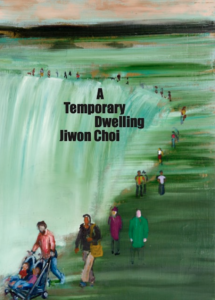 Review by Jessica de Koninck
Review by Jessica de Koninck
With a keen eye for the ironic and with dark humor, A Temporary Dwelling (Spuyten Duyvil Press), Jiwon Choi’s third poetry collection, engages deeply with impermanence and loss. Jiwon Choi is a poet, teacher and New York urban gardener. Much of her work explores the Korean diaspora.
Actual dwellings, like the apartments in which she grew up and in which she lives, and dwellings as metaphor for the body, the community, the nation, culture, religion, the land, the planet, the universe, form the heart of Choi’s collection. The poems are in deep conversation with all these dwellings, both actual and imagined.
The opening poem, a strange and inviting list poem, “Insect in Utopia,” considers the notion of the animal body in connection to the human body. The poem personifies the insect.
I was told I could rip the head off my mate here
I was told I will go through at least three sheddings
before achieving perfect symmetry here
my head impaled on to my thorax with an abdomen that lights up
at the mention of potato chips
The idea of utopia, “here,” “here,” a place of imagined perfection, is upended. Utopia isn’t utopian. Life in the actual world is brutal as the poems, “Vincent Chin You Were Living the American Dream,” a violent and unflinching depiction of racism, and “Cats in Bags” reflect.
The collection explores the body, the appearance of the body and our cultural fixation with the physical and with body weight as signifiers of beauty. The poems explore animal bodies as in “Good Crows, “Bobolinks” and others. They explore dead bodies.
Discussions of the body necessarily result in conversations about the food that sustains it, and Choi uses food imagery to great success. Food highlights the ongoing trope of Korean American culture. “White Bread,” a proxy for race, finds juxtaposition with “Korean Breakfast” in which food becomes memory. Memory evokes the lost mother, a central figure, as does “Moth in Your Kitchen,” in which the body of a moth, transforms into a mosquito then into a heron, and, finally into the dead mother.
some god’s bad joke
about karma?
Anything that is temporary involves a sense of loss. And these poems wrestle with loss:
our mothers and fathers go back to the everlasting
where do you think babies come from, anyway?
Finally, in the “Epilogue,” the poems return to the earth as planet and as substance. The earth changes, but continues:
the land changing its mind
shifting keeps shifting
in witness of creatures made to resemble lichen and moss (“Contemplate Mountains”)
While “Here’s the Mississippi” looks back to the beginning of humankind and the danger the natural world presents. The last poem is the collection’s title’s poem. The poem is not a summary. Instead, Choi deftly juggles time to create a snapshot rooted in the small details of daily life, a ride in a car.
Choi’s use of language is clever and fresh. Her poems are filled with images and lines from popular culture used in new ways. For example, this pun on “Wonder Bread” from “Kill the Bitch and You Eliminate the Litter.”
It’s a wonder bread gets buttered
even on the one side
The lines often tend to be short, encouraging the reader to linger. Though our dwellings are temporary, Choi’s poems investigate them in a rich and deeply satisfying way.
A Temporary Dwelling by Jiwon Choi
Spuyten Duyvil Press 2024
ISBN 9781959556886
Jessica de Koninck: The author of two poetry collections, Repairs (Finishing Line Press) and Cutting Room (Terrapin Books), Jessica de Koninck’s poems have been featured on Verse Daily and the Writer’s Almanac. Her reviews appear in Atticus Review, Vassar Review, Jewish Currents and elsewhere. Jessica co-edits, ALTE, a multi-platform publication. For more go to www, jessicadekoninck.com
Read Jiwon Choi’s Author’s Note on Writing A Temporary Dwelling
